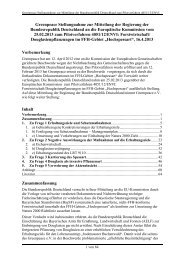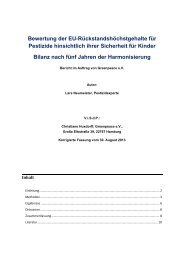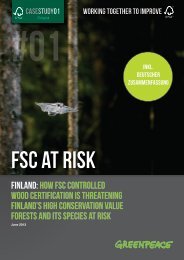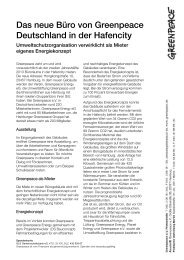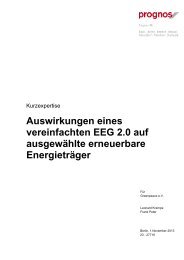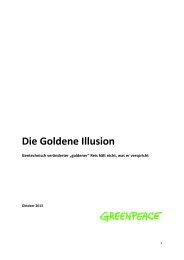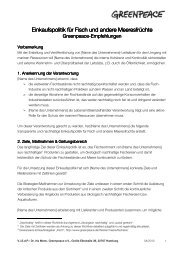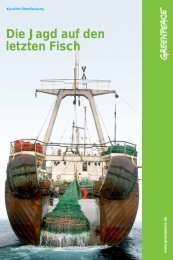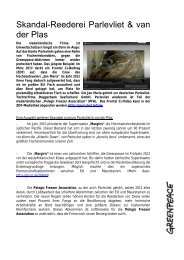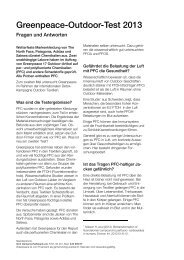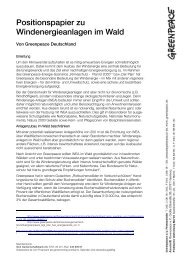HOW THE PALM OIL INDUSTRY IS - Greenpeace
HOW THE PALM OIL INDUSTRY IS - Greenpeace
HOW THE PALM OIL INDUSTRY IS - Greenpeace
You also want an ePaper? Increase the reach of your titles
YUMPU automatically turns print PDFs into web optimized ePapers that Google loves.
55<br />
In addition, while domestic production of biomass and use<br />
of waste undoubtedly has a critical role to play, use of these<br />
resources to drive cars rather than heat and power our homes<br />
may be inefficient. A report for the UK Government observes:<br />
‘When looking at opportunities to reduce CO 2<br />
emissions from<br />
fuels, it is important to understand the linkages with other sectors.<br />
In particular, road transport must compete for scarce primary<br />
energy sources with other sectors, including power generation,<br />
animal feed, and food. The challenge is therefore to ensure that<br />
low-carbon energy sources are put to the most efficient, effective,<br />
environmentally responsible and socially just use.’ 347<br />
today’s empire building,<br />
tomorrow’s downfall<br />
Many other countries from oil dependent regions are following<br />
Europe’s example and turning to biofuels from Indonesia’s<br />
rainforests. The Chinese Government expects that by 2020<br />
biofuel will account for 15% of transport fuel. 348 India has set a<br />
target of 20% of diesel from biofuels by 2012. 349 Already, China<br />
and India are the most significant palm oil consumers in the<br />
world, using about 25% of palm oil production. 350<br />
China and other developing countries in Asia are seeing rapid<br />
growth of road transport. Car ownership in China has doubled<br />
in the last five years and it already has the third highest car sales<br />
in the world. 351 By 2030, predictions by Goldman Sachs are<br />
that India and China will have 400 million cars – three times the<br />
number the USA had in 2000. By 2050, these two countries<br />
are on track to have 1.1 billion cars, nearly double the total<br />
global number of cars in 2000. 352<br />
That means a lot of land dedicated to biofuel production. The<br />
Chinese government is already thinking ahead and turning<br />
its eyes to the region of Papua – the last great expanse of<br />
rainforest in Southeast Asia.<br />
At the beginning of 2007, a strategic partnership of China National<br />
Offshore Oil Corporation (CNOOC), 353 Hong Kong Energy (HKE)<br />
and PT Smart, a subsidiary of RSPO member Sinar Mas engaged<br />
in a US$5.5 billion venture to develop what could be the world’s<br />
largest oil palm and biofuel project to date, covering 1 million<br />
hectares of plantations in Papua and Kalimantan. 354<br />
Third largest company in the world 355 and a member of<br />
the RSPO, 356 HSBC has a specific policy not to provide<br />
financial services to companies involved in ‘projects located<br />
in and which significantly degrade or convert Critical Natural<br />
Habitats’ including rainforests. 357 HSBC is a principle banker<br />
for the parent holding company for HKE. 358 HSBC also holds<br />
up to a quarter of shares in one Sinar Mas subsidiary. 359<br />
Documents obtained by <strong>Greenpeace</strong> 360 indicate that RSPO<br />
member Sinar Mas has plans far beyond this million hectare<br />
project. The internal company presentation shows that the Sinar<br />
Mas has mapped out plans to gain control of up to 2.8 million<br />
hectares of rainforest in Papua. Because, by Indonesian law,<br />
a single company cannot control more than 200,000 hectares<br />
of plantations in Papua, 361 Sinar Mas has already formed 14<br />
subsidiaries. 362<br />
Planned facilities include a 7Mt/year crude palm oil refinery,<br />
a 5Mt/year biodiesel plant and bulk-handling terminals. 363<br />
To achieve this landgrab, according to investigations by a<br />
Singapore-based journalist, throughout 2007 Sinar Mas has been<br />
surveying plantation sites and wooing the local bureaucracy. 364



